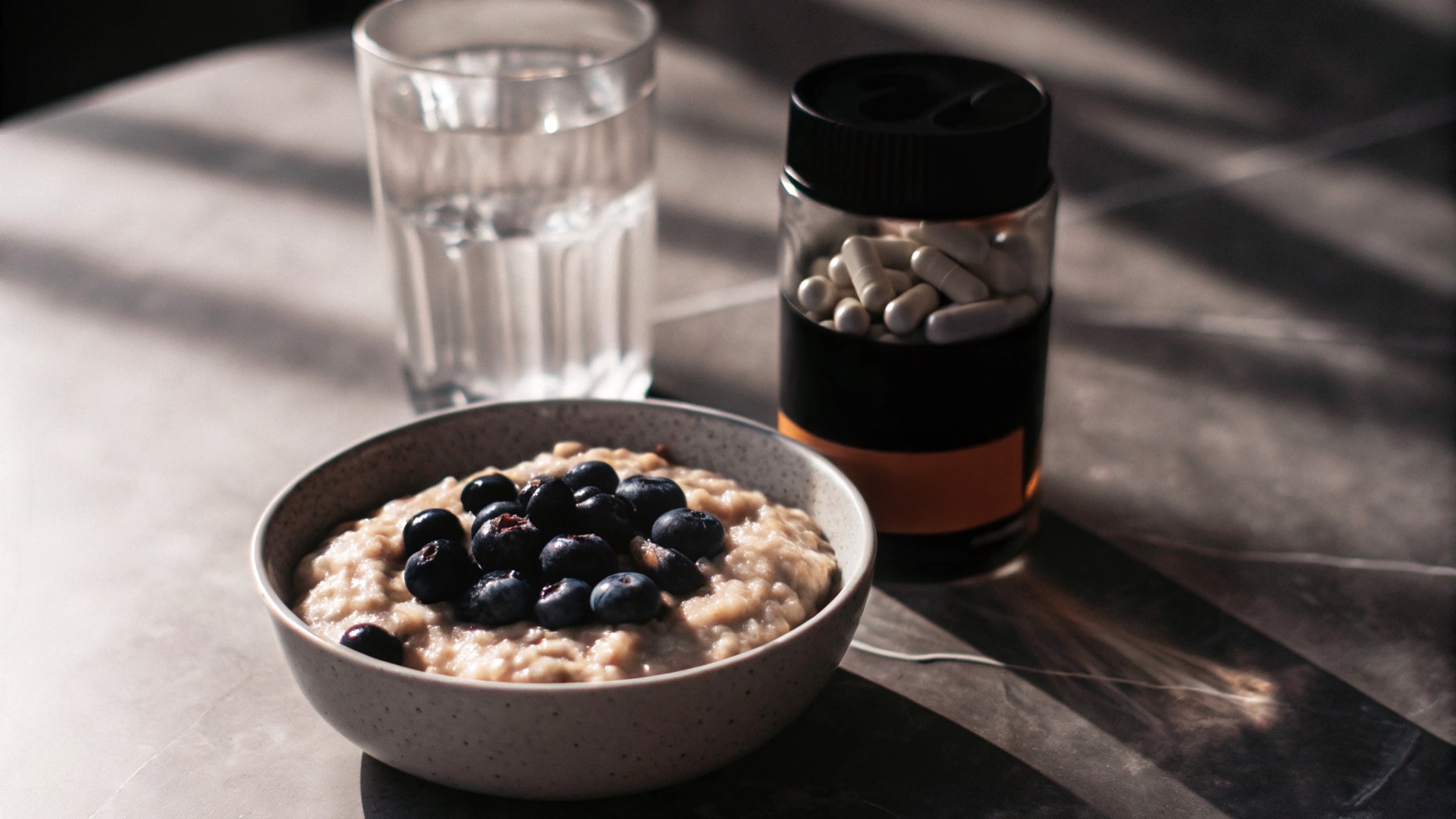Key takeaways
- The most scientifically backed eye supplement formula includes lutein, zeaxanthin, vitamin C, vitamin E, zinc, and copper, used in high doses as established by clinical research.
- Lutein and zeaxanthin filter blue light, omega-3 fatty acids support retinal health, and antioxidants protect against oxidative damage.
- Age-related macular degeneration, cataracts, and dry eyes show the most substantial evidence for the benefits of supplements.
Overview
In our screen-dominated world, protecting your vision has never been more critical. With millions of people spending hours daily staring at digital devices and an aging population facing an increased risk of eye diseases, eye health supplements have emerged as a popular solution for maintaining optimal vision. But do these supplements work, and which nutrients truly make a difference?
The answer lies in decades of rigorous scientific research, particularly the landmark Age-Related Eye Disease Studies (AREDS and AREDS2), which have revolutionized our understanding of how specific nutrients can protect and preserve our eyesight. The particular combination of vitamins and minerals developed from these studies is known as the AREDS formulation. From lutein and zeaxanthin to omega-3 fatty acids, certain compounds have demonstrated their value in supporting eye health and potentially slowing the progression of severe conditions, such as age-related macular degeneration.
It’s important to note that eye health supplements are not a cure for eye diseases, but they can help support and maintain vision.
What are eye health supplements, and why do people use them?
Eye health supplements are specially formulated nutritional supplements containing vitamins, minerals, and other nutrients specifically chosen to support optimal eye function. These supplements typically include a combination of antioxidants, carotenoids, and essential fatty acids that research has shown to be linked to improved eye health outcomes. Nutritional supplements are designed to complement a balanced diet, ensuring you receive the essential nutrients needed for optimal eye health.
People turn to these supplements for several compelling reasons:
- Prevention of age-related eye diseases like macular degeneration and cataracts
- Relief from digital eye strain caused by prolonged screen use
- Support for dry eye symptoms that affect millions of people
- General vision maintenance as part of a proactive health approach
- Nutritional insurance when diet alone may not provide adequate eye-supporting nutrients
- Supplementing a balanced diet to ensure the body receives all necessary vitamins and minerals for maintaining healthy eyes
The growing interest in eye health supplements reflects our increasing awareness of vision as a vital component of overall quality of life, particularly as we age and face greater exposure to environmental stressors. Supplementing with specific nutrients can help support the body’s overall eye health, particularly when dietary intake is insufficient.
The science behind eye health supplements: AREDS and AREDS2 studies
The foundation of modern eye health supplementation rests on two groundbreaking studies conducted by the National Eye Institute: the Age-Related Eye Disease Study (AREDS) and its follow-up, AREDS2. Both studies followed participants for several years to evaluate the effects of high-dose antioxidant and zinc formulations on age-related macular degeneration.
The key findings from AREDS and AREDS2 indicate that specific combinations of vitamins and minerals can help slow the progression of advanced macular degeneration; however, further research is needed to confirm and expand upon these findings.
The original AREDS study
The original AREDS study, completed in 2001, was a landmark clinical trial involving over 3,600 participants. Researchers found that a specific combination of high-dose antioxidants and zinc could reduce the risk of advanced age-related macular degeneration (AMD) by approximately 25% over a five-year period. The study evaluated the effects of a treatment involving high doses of antioxidants and zinc as a medical intervention for AMD. The original formula included:
- Vitamin C (500 mg)
- Vitamin E (400 IU)
- Beta-carotene (15 mg)
- Zinc (80 mg)
- Copper (2 mg)
AREDS2: Refining the formula
Published in 2013, the AREDS2 study refined the original formula based on new research and safety concerns. The key changes included:
- Adding lutein (10 mg) and zeaxanthin (2 mg), the two carotenoids critical for eye health that accumulate in the macula
- Removing beta-carotene, due to the increased lung cancer risk in smokers
- Testing omega-3 fatty acids, though these didn’t show additional benefit in this particular study
The AREDS2 formula demonstrated that lutein and zeaxanthin could effectively replace beta-carotene while maintaining the protective benefits against AMD progression.
Key nutrients for eye health
Understanding the specific nutrients that support eye health helps you make informed decisions about supplementation. These nutrients are essential for maintaining healthy eyes and supporting healthy vision throughout life. Here are the most critical compounds backed by research:
Lutein and Zeaxanthin: The macular protectors
These carotenoids are the most essential nutrients for eye health. They:
- Accumulate in the macula, the part of the retina responsible for central vision
- Filter harmful blue light, acting as natural sunglasses for your eyes
- Provide antioxidant protection, neutralizing free radicals that can damage eye cells
- Support macular pigment density, which correlates with better visual function
One research study found that supplementation with lutein, zeaxanthin, and omega-3 fatty acids improved macular pigment density and visual function in young adults who had long-term use of digital devices.
Omega-3 fatty acids: Essential for retinal health
Particularly DHA (docosahexaenoic acid) and EPA (eicosapentaenoic acid), omega-3s:
- Support retinal cell structure, DHA makes up about 60% of retinal fatty acids
- Reduce inflammation, helping with dry eye symptoms
- Support tear production, maintaining a healthy tear film
- May protect against AMD, though research is ongoing
Zinc: The retinal mineral
This essential mineral:
- Concentrates in the retina, particularly in the macula
- Supports enzyme function, crucial for vitamin A metabolism
- May slow AMD progression, as demonstrated in AREDS studies
- Works synergistically with antioxidants for enhanced protection
Vitamins C and E: Powerful antioxidants
These vitamins provide:
- Free radical protection, preventing oxidative damage to eye tissues
- Support for blood vessel health is essential for retinal circulation
- Potential cataract prevention, by protecting lens proteins
- Enhanced effectiveness, when combined with other antioxidants
Specific eye conditions that may benefit from supplements
Research has identified several eye conditions that may respond positively to targeted supplementation: age-related macular degeneration, cataracts, and glaucoma. These conditions are often associated with oxidative stress, and treatment strategies frequently focus on supporting eye health through the use of antioxidants and other nutrients.
Age-related macular degeneration (AMD)
AMD is the leading cause of vision loss in adults aged 50 and older. The AREDS2 formula has shown significant benefits for people with intermediate AMD or advanced AMD in one eye, potentially:
- Reducing progression risk by 10-25%
- Slowing vision loss
- Preserving central vision longer
However, current research indicates that supplements like AREDS2 provide limited or no benefit for people in the early stages of AMD.
Cataracts
While the evidence is less definitive than for AMD, antioxidant supplements may help with cataracts by:
- Protecting lens proteins from oxidative damage
- Potentially delaying cataract formation
- Supporting overall lens health
Some research also suggests that certain supplements reduce the need for cataract surgery by slowing the progression of cataracts.
Dry eye syndrome
Omega-3 fatty acids and vitamins have shown particular promise for dry eyes by:
- Improving tear quality and quantity
- Reducing inflammation in the tear glands
- Enhancing overall eye comfort
A comprehensive review by Mares (2016) highlighted the importance of lutein and zeaxanthin isomers in various eye health conditions, emphasizing their role in both disease prevention and visual performance.
Digital eye strain and supplements for screen users
In our digital age, computer vision syndrome, also known as digital eye strain, affects up to 90% of people who use screens for more than three hours a day. Symptoms include:
- Eye fatigue and discomfort
- Dry or watery eyes
- Blurred or double vision
- Headaches and neck pain
- Difficulty focusing
Consumers can easily find supplements containing nutrients that may help with digital eye strain online or in stores.
How supplements may help?
Research suggests that specific nutrients can help alleviate digital eye strain:
- Lutein and zeaxanthin filter blue light from screens
- Omega-3 fatty acids support tear production and reduce inflammation
- Antioxidants protect against oxidative stress from prolonged screen use
However, supplements should complement, not replace, good screen habits, such as the 20-20-20 rule (every 20 minutes, look at something 20 feet away for 20 seconds).
Safety considerations and potential side effects
While eye health supplements are generally safe for most people, it’s essential to be aware of potential risks. Always consult your doctor before beginning any eye health supplement regimen to ensure it is safe and appropriate for your individual needs.
Common side effects
- Gastrointestinal upset, particularly with high-dose zinc
- Yellowing of skin is rare, but it is possible with high beta-carotene intake
- Allergic reactions to specific ingredients like fish-derived omega-3s
Important precautions
- Smokers should avoid beta-carotene due to increased lung cancer risk
- High-dose vitamin E may increase bleeding risk in some individuals
- Zinc can interfere with copper absorption, which is why AREDS formulas include both
- Drug interactions are possible with blood thinners and other medications
Special populations
Pregnant women, nursing mothers, and people with specific health conditions should always consult healthcare providers before starting any supplement regimen.
When to consult healthcare providers
Professional guidance is essential in several situations:
- Before starting any new supplement, especially if you have health conditions
- If you’re taking medications, check for potential interactions
- When experiencing vision changes, supplements aren’t a substitute for proper eye care
- For personalized recommendations, based on your specific risk factors and needs
An eye care professional can assess your risk for eye diseases and recommend appropriate supplementation as part of a comprehensive eye health strategy.
Diet vs. supplements for eye health
While supplements can be beneficial, they work best as part of a comprehensive approach that includes a nutrient-rich diet. Consuming a variety of foods, especially leafy green vegetables like spinach and kale, is vital for obtaining essential nutrients that support eye health. Many people are aware of the benefits of certain foods for maintaining good vision, as these foods provide natural sources of nutrients such as lutein and zeaxanthin. Foods naturally high in eye-healthy nutrients include:
Lutein and Zeaxanthin sources
- Dark leafy greens (spinach, kale, collard greens)
- Corn and peas
- Egg yolks
- Orange and yellow vegetables
Omega-3 rich foods
- Fatty fish (salmon, mackerel, sardines)
- Walnuts and flaxseeds
- Chia seeds
Antioxidant-rich options
- Berries and citrus fruits
- Nuts and seeds
- Colorful vegetables
When should supplements be taken?
Supplements may be particularly beneficial for:
- People with limited access to fresh, nutrient-dense foods
- Those with dietary restrictions or absorption issues
- Individuals at high risk for eye diseases
- People who don’t consistently eat eye-healthy foods
Vision supplements can provide targeted nutrients for individuals who are unable to obtain sufficient amounts from food sources.
How to choose quality eye health supplements?
Not all supplements are created equal. Here’s what to look for:
Third-party testing
Choose supplements that have been independently tested for:
- Purity and potency
- Absence of contaminants
- Accurate labeling
Evidence-based formulations
Look for supplements that:
- Follow AREDS2 research guidelines
- Include clinically studied doses
- Combine synergistic nutrients
Quality indicators
- USP (United States Pharmacopeia) verification
- NSF International certification
- Good Manufacturing Practice (GMP) compliance
- Clear, detailed labeling
Red flags to avoid
- Unrealistic health claims
- Proprietary blends without specific amounts
- Extremely low prices that seem too good to be true
- Lack of contact information or company transparency
Bottom line
Eye health supplements, particularly those based on AREDS2 research, offer genuine benefits for specific populations and conditions. The evidence is strongest for people with intermediate AMD or those at high risk for age-related eye diseases. However, supplements work best as part of a holistic approach that includes:
- Regular comprehensive eye exams
- A nutrient-rich diet
- Protection from UV light
- Proper screen habits
- Not smoking
- Managing underlying health conditions
While current studies highlight the potential benefits of antioxidants and carotenoids, further research is needed to fully understand the long-term effects and possible risks associated with eye health supplements. As research emphasizes in their mechanistic review of carotenoids in eye health, these nutrients work through multiple pathways to support vision and protect against disease.
Frequently asked questions (FAQs)
- How long does it take to see benefits from eye health supplements?
Most studies show benefits over months to years rather than weeks. The AREDS2 study followed participants for five years to demonstrate significant effects. Most people notice improvement in their vision or eye health after several months of consistent supplement use.
- Can I take eye health supplements if I’m already eating a healthy diet?
Yes, supplements can provide insurance against nutritional gaps and may offer higher concentrations of specific nutrients than diet alone.
- Are there any interactions between eye health supplements and medications?
Yes, particularly with blood thinners and certain other medications. Always consult your healthcare provider before starting supplements.
- Do I need different supplements for different eye conditions?
The AREDS2 formula addresses multiple conditions; however, specific conditions, such as dry eyes, may benefit from targeted omega-3 supplementation.
- Can children take eye health supplements?
Generally, a healthy diet is sufficient for children. Supplements should only be considered under the guidance of a professional for specific health conditions.
References
- Age-Related Eye Disease Study 2 Research Group. (2013). Lutein + zeaxanthin and omega-3 fatty acids for age-related macular degeneration: the Age-Related Eye Disease Study 2 (AREDS2) randomized clinical trial. JAMA, 309(19), 2005-2015.
- Johra, F. T., Bepari, A. K., Bristy, A. T., & Reza, H. M. (2020). A mechanistic review of β-carotene, lutein, and zeaxanthin in eye health and disease. Antioxidants, 9(11), 1046.
- Mares, J. (2016). Lutein and zeaxanthin isomers in eye health and disease. Annual Review of Nutrition, 36, 571-602.
- Wang, L., Ma, M., Li, Y., Pei, C., Wang, J., Li, J., Yang, L., et al. (2024). Effect of supplementation with lutein, zeaxanthin, and omega-3 fatty acids on macular pigment and visual function in young adults with long-term use of digital devices. Frontiers in Nutrition, 11, 1422468.









